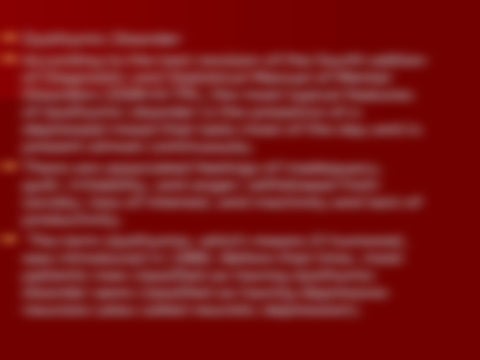Dysthymic Disorder According to the text revision of the fourth edition
of Diagnostic and Statistical Manual of Mental Disorders (DSM-IV-TR), the most typical features of dysthymic disorder is the presence of a depressed mood that lasts most of the day and is present almost continuously. There are associated feelings of inadequacy, guilt, irritability, and anger; withdrawal from society; loss of interest; and inactivity and lack of productivity. The term dysthymia, which means ill humored, was introduced in 1980. Before that time, most patients now classified as having dysthymic disorder were classified as having depressive neurosis (also called neurotic depression).


